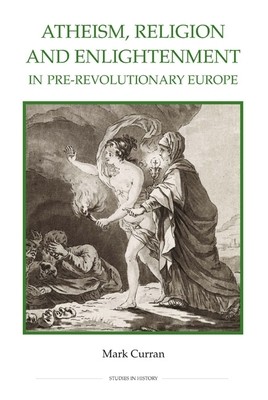
- We will send in 10–14 business days.
- Author: MARK CURRAN
- Publisher: Royal Historical Society
- ISBN-10: 0861933168
- ISBN-13: 9780861933167
- Format: 15.8 x 24.4 x 1 cm, kieti viršeliai
- Language: English
- SAVE -10% with code: EXTRA
Atheism, Religion and Enlightenment in Pre-Revolutionary Europe (e-book) (used book) | bookbook.eu
Reviews
Description
An investigation into the influence of, and reaction to, the atheistic writings of the baron d'Holbach.
The Baron d'Holbach, a prominent figure in the French Enlightenment, is best known for his writings against religion. His prolific campaign of atheism and anti-clericalism, waged from the printing presses of Amsterdam in the yearsaround 1770, was so radical that it provoked an unprecedented public response. For the baron's enemies, at least, it suggested the end of an era: proof that the likes of Voltaire and Jean-Jacques Rousseau were simply a cabal of atheists hell-bent on the destruction of all that was to be cherished about religion and society. The philosophes, past their prime and under fire, recognised the need to respond, but struggled to know which way to turn. France's institutional bodies, lacking unity and fatally distracted, provided no credible lead. Instead, the voice of reason came from an unlikely source - independent Christian apologists, Catholic and Protestant, who attacked the baron on his own terms and, in the process, irrevocably changed the nature of Christian writing.This book examines the reception of the works of the baron d'Holbach throughout francophone Europe. It insists that d'Holbach's historical importance has been understated, argues the case for the existence of a significant "Christian Enlightenment" and raises questions about existing secular models of the francophone public sphere. MARK CURRAN is the Munby Fellow in Bibliography, Cambridge University Library.
EXTRA 10 % discount with code: EXTRA
The promotion ends in 21d.17:08:05
The discount code is valid when purchasing from 10 €. Discounts do not stack.
- Author: MARK CURRAN
- Publisher: Royal Historical Society
- ISBN-10: 0861933168
- ISBN-13: 9780861933167
- Format: 15.8 x 24.4 x 1 cm, kieti viršeliai
- Language: English English
An investigation into the influence of, and reaction to, the atheistic writings of the baron d'Holbach.
The Baron d'Holbach, a prominent figure in the French Enlightenment, is best known for his writings against religion. His prolific campaign of atheism and anti-clericalism, waged from the printing presses of Amsterdam in the yearsaround 1770, was so radical that it provoked an unprecedented public response. For the baron's enemies, at least, it suggested the end of an era: proof that the likes of Voltaire and Jean-Jacques Rousseau were simply a cabal of atheists hell-bent on the destruction of all that was to be cherished about religion and society. The philosophes, past their prime and under fire, recognised the need to respond, but struggled to know which way to turn. France's institutional bodies, lacking unity and fatally distracted, provided no credible lead. Instead, the voice of reason came from an unlikely source - independent Christian apologists, Catholic and Protestant, who attacked the baron on his own terms and, in the process, irrevocably changed the nature of Christian writing.This book examines the reception of the works of the baron d'Holbach throughout francophone Europe. It insists that d'Holbach's historical importance has been understated, argues the case for the existence of a significant "Christian Enlightenment" and raises questions about existing secular models of the francophone public sphere. MARK CURRAN is the Munby Fellow in Bibliography, Cambridge University Library.


Reviews